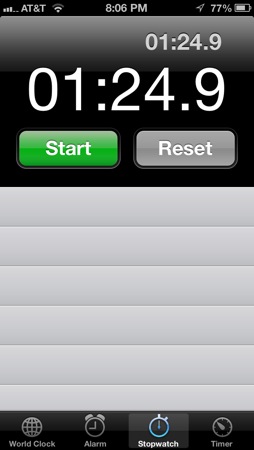Years ago, a friend of mine went to traffic school. Afterward, she said she learned something useful: Most red lights last no longer than 3 minutes. Armed with that small revelation, she said she would stop for them sooner in the future.
 Since then, I’ve used this same logic to help with little things I didn’t want to do. For example:
Since then, I’ve used this same logic to help with little things I didn’t want to do. For example:
Buy gas? Who wants to stop?
But wait. It only takes 5 minutes. And that’s better than driving on fumes and feeling anxious.
Floss? Wouldn’t I rather just go to bed? Still, it’s good for you. Okay, how long does it take? One & a half minutes.
That’s easy enough. Besides, it’s a good idea if you want to keep your teeth, which also seems like a good idea.
If you want to create a good habit, and it is something that you a) aren’t crazy about doing and b) doesn’t take very long, then figuring out how long it really takes can help to get over an aversion to doing it.
Making the bed makes the room look tidy all day: 3 minutes.
Clean up the kitchen. Looks good: 5 minutes, maybe 10.
Send a card to someone who could use a kind word: 5 minutes.
The little things we wish we’d do or would be happier if we’d do can be a long list. Remembering that they take just a few minutes can help, especially when the benefits last a lot longer than the task itself.
